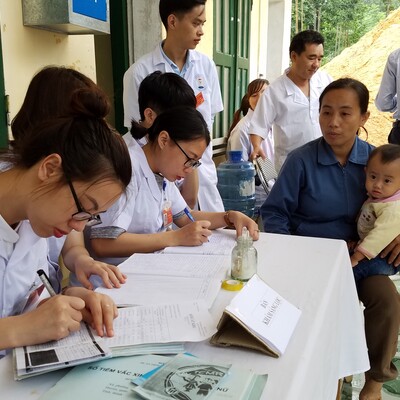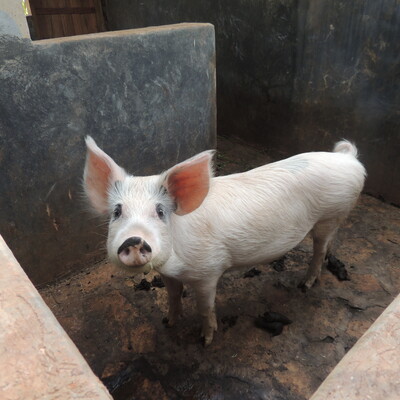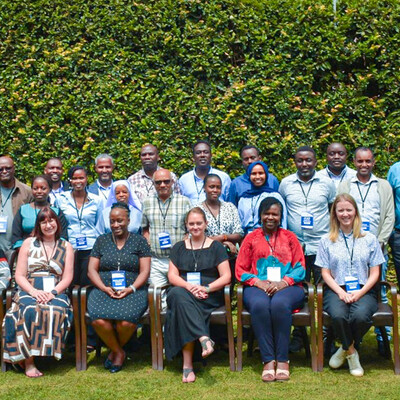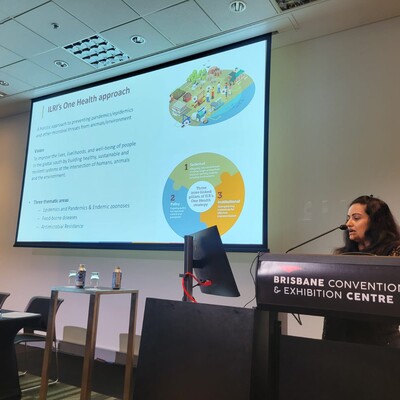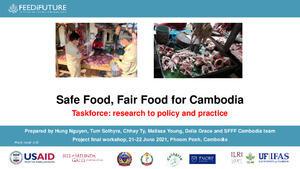
Second Malawi symposium promotes One Health in research and academia
Stakeholders and partners in the human, animal and environmental health sectors in Malawi have renewed their commitment to collaborate more in a bid to promote the adoption of the One Health approach to address health and sustainable development challenges in the country. The partners, drawn from the academia, public and private sector as well as the civil society were convening from the 7-8th May 2024 for the second Malawi One Health symposium held at the Lilongwe University of Agriculture and Natural Resources (LUANAR) under the theme ‘Advancing One Health: Integrating food safety and environmental health in Malawi’.
An assessment of the One Health landscape in Malawi conducted by the Capacitating One Health in Eastern and Southern Africa (COHESA) project in 2022 - 2023 found that almost all existing One Health platforms in government, academia, and the private sector were informal, although in some cases stakeholders collaborated in coordination of activities, research, and some degree of policymaking.
In a panel discussion on ‘One Health governance, research to policy,’ experts from the Ministry of Health and the departments of Animal Health, Livestock, and Environmental Affairs called for institutionalization of One Health through creation of formal structures to streamline collaboration between ministries. They reiterated the importance of identifying stakeholders and their roles in order to improve structuring, communication and coordination, especially during pandemics.
They highlighted ‘the need to develop a national One Health policy and strategy, which should be operationalized and owned by government; the policies need to speak to what is on the ground and provide guidance’.
Stakeholders emphasized the role of environmental health in One Health and the need for proactive engagement. They noted that while the legislation to promote the collaboration already existed, its implementation and collaboration with the animal and human sectors had remained a challenge.
Agnes Mbachi Mwangwela, deputy vice chancellor LUANAR, commended the role of stakeholder engagement in promoting One Health.
‘The discussions at the symposium define the direction that needs to be taken by countries in Africa; using One Health to respond to global challenges. It is important that all stakeholders are brought on board,’ she said.
She also commended the International Livestock Research Institute (ILRI) for its support and emphasized the need to establish structures that will ensure continued collaboration for the benefit of students and countries, even after project closeout. For the last five years, ILRI has supported undergraduate veterinary students at LUANAR to conduct research at the university through funding, technical support and mentoring to the young scientists. Some of the students who have benefited from the ILRI-LUANAR capacity development collaboration presented their work in a poster session at the symposium.

At the ‘One Health in academia in Malawi’ panel discussion, experts cited challenges and the available opportunities for One Health training. They noted opportunities to streamline and consolidate programs and modules at the universities that have components of One Health such as environment, communicable and non-communicable disease, food safety and climate change.
They recommended that, there should be early engagement of policymakers in the research process, so that research provides data for One Health advocacy by policymakers. They noted that One Health, though relatively new in Malawi, provides numerous research opportunities for joint research and shared access to resources, equipment and collaboration between researchers and institutions.
Stakeholders in the education sector proposed the formation of a One Health consortium to identify tangible activities that can be implemented jointly to strengthen interdisciplinary collaboration. They identified One Health research priorities for the country as: Identifying key zoonotic disease and their hotspots in animals and humans; and conducting surveillance of disease pathogens, and their transmission dynamics using genomic studies. Other important research areas include key chronic diseases and their drivers in animals and humans; food safety in Malawi, antimicrobial resistance (AMR) and other contaminants in the food and water systems, and impact of climate change on animal, human and environmental health.
One Health research and innovations
Various research initiatives were showcased during presentations at the symposium highlighting ongoing efforts to address health challenges and promote sustainable development using a One Health approach. Some highlights include:
Food systems transformation for One Health in Africa
Fosta Health, a consortium of 12 organizations from Africa and Europe is investigating the One Health outcomes associated with food system changes in diverse contexts in southern Africa. Some of the interventions included; 1) transformations within and out of maize production, the region’s staple food; 2) transformations of land and water use, including intensification, land use expansion and irrigation 3) transformations from domestic to export markets, focusing on high-value commodity crops, such as fresh fruits and vegetables, and 4) diet diversification and transformations towards higher protein, fats and refined oils in diets, with a focus on the interconnected supply chains of soya bean, poultry and beef.
Community engagement with AMR using responsive dialogues
Community engagement is key to raising awareness about AMR and promoting responsible use of antimicrobials. Various interventions that have been used by Ministry of Health and Malawi Liverpool Wellcome Clinical Programme as part of world AMR awareness week were showcased including community walks, media engagements, bulk messages on AMR, symposia, cycling, poetry, theatre, music, dance and responsive dialogue on AMR. The responsive dialogues comprised of communities devising solutions to addressing AMR and its consequences at grassroots level. Researchers worked with community members to develop contextually relevant policies that respond to local realities.
Bacteriophage technology as a tool for advancing One Health
Researchers from the Malawi University of Science and technology (MUST), ILRI and Jagiellonian University in Poland presented their research on using bacteriophage technology as a tool for advancing One Health. Bacteriophages are Viruses that specifically infect bacteria. Research is ongoing on how Phages can be used to replace antibiotics and reduce drug resistance, including antimicrobial resistance.
Evaluating perceived risks of road injury and air pollution among primary school learners during commutes’ using Photovoices
A presentation by Kamuzu University of Health sciences showcased the interconnection between human and environmental health. The study assessed the risk for road injury and exposure to poor air quality among school children on their journeys to school using photovoice, a community-based participatory research methodology, allowing students to take photographs of risks they identify/ perceive on their way to/ from school.
The participatory research gave a voice to children to contribute to global and national policy positions on road traffic injuries and air pollution using the value of everyday experiences. More here;
The symposium was organized under the COHESA project by LUANAR in collaboration with the University of Malawi, Kamuzu University of Health Sciences, Malawi University of Science and Technology, and the Public Health Institute of Malawi. The project ‘Capacitating One Health in Eastern and Southern Africa’ (COHESA) is co-funded by the OACPS Research and Innovation Programme, a programme implemented by the Organization of African, Caribbean and Pacific states (OACPS) with the financial support of the European Union”.
Symposium presentations are available here






